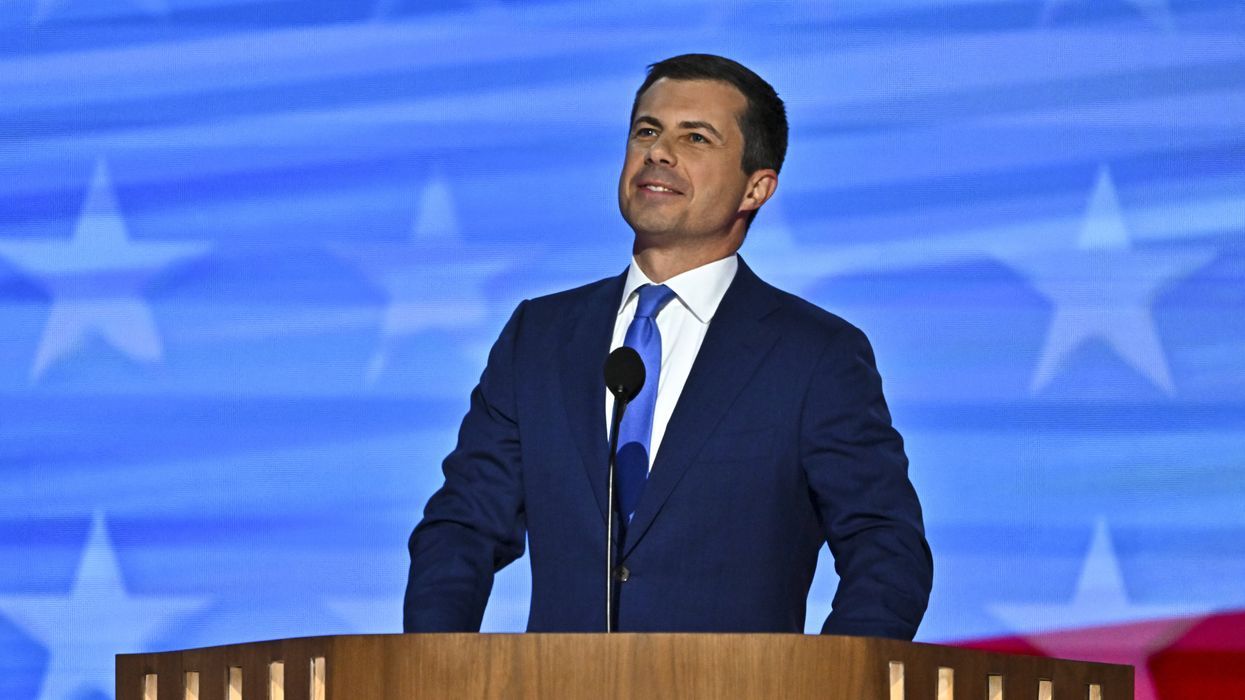Tseng is an equity strategy program manager at Google, a Paul and Daisy Soros fellow, and a public voices fellow of The OpEd Project.
In his speech at the Democratic National Convention, Transportation Secretary Pete Buttigieg never said the word “gay.” Not once. He didn’t mention his husband, Chasten, by name or even use the term “husband.” He never mentioned that he is a man who loves another man, nor did he give any explanation of why his family seemed like an impossibility just 25 years ago, beyond saying that it did.
In fact, the only thing that might have tipped you off about his sexuality was his mention of pro wrestling, a very queer sport. The omission of any aspect of his gayness made me long for a much broader pool of candidates onto whom I could project my hopes and dreams as a gay man.
To be fair, “Mayor Pete” is unequivocally the most famous gay man in American politics. He’s the highest ranking LGBTQ+ federal official ( 14th in line for the presidency) and has a personal story that is known to a broad swath of the country due to his own campaign for president in 2020. He is widely recognized as one of the Democratic Party’s best communicators and as the nation’s first credible Millennial candidate for president.
So a good-faith reading of these omissions is that he assumes his audience already knows the biographical elements that powered his meteoric rise. And perhaps a more realistic reading is that Buttigieg plans to one day run for president (or governor of Michigan, where he now lives) and is betting that respectability politics will be his most effective strategy for appealing to the broadest set of voters. I would even grant him the generous reading that he is genuinely uninterested in discussing his identity in depth, and so this calibration is authentic to who he is.
Still, Mayor Pete’s reticence to discuss his identity in any way that might cause an “ick factor” for his future constituents makes me feel like rolling my eyes with my entire body. As New Yorker contributor Masha Gessen wrote in 2020, Buttigieg’s “politics of being ‘just like you’ leaves out the people who cannot or do not want to be just like conventional straight people, whether in appearance or in the way we construct our lives and families.” Implicit in that is the idea that his “passing privilege” — his ability to appear heterosexual, and the fact that he is an otherwise anodyne cis-white guy — is what he believes is his greatest selling point: that being a”palatable gay” is the only way any gay man could ever get elected to higher office in the United States.
But even as a palatable gay myself, with my husband of nearly 10 years and twin girls we adopted almost exactly a year before Pete and Chasten adopted their twins (his most relatable line in his speech: “when the dog is barking, and the air fryer is beeping, and the mac and cheese is boiling over, and it feels like all the political negotiating experience in the world is not enough for me to get our 3-year-old son and daughter to just wash their hands and sit at the table”), I can’t help but feel a sense of loss that our chance to be represented on a national stage is so contingent on us living our lives in such a prescribed way. And since he doesn’t seem willing to handle conversations about the less heteronormative aspects of queer identity and intersectionality, those crucial parts of our community’s shared struggle seem far from the national discourse.
The truth is that I’m still rooting for Mayor Pete. I hope he does well. I hope he gets elected to additional positions and is able to use his power and influence to make lives better, because I truly believe that is his goal. But I don’t want to be forced to put all of my gay politics eggs in the Pete Buttigieg basket. Unfortunately, the pipeline of queer political talent is thin. Of the 480 congressional and gubernatorial seats up for election this year, there are only 13 LGBTQ candidates endorsed by the LGBTQ+ Victory Fund, the public affairs committee supporting queer candidates. Because the bench is so shallow, we don’t have enough representation to truly encompass the wide spectrum of queer identity. Perhaps our most radical gay federal official, Rep. Robert Garcia (D-Calif.), who is unabashedly gay and speaks often of his queerness, is still a cis-man who wears a suit to work every day.
It’s easy to say that we queer folks need to get off the couch and run for office, to be the representation we want to see in the world. But it’s not hard to see how thick a skin it takes to be a queer public figure, particularly in a politically charged (and increasingly threatening) America. Mayor Pete knows that too; he’s lived it with every step of his career. It’s gotten him far, but now that he has risen so high on the national stage, it’s time for him to take the next courageous step and talk about it.
He might advocate for care infrastructure for aging LGBTQ seniors, or talk about the impact that PrEP and the mPox vaccine have had on public health, or maybe even mention once in a while that trans rights are human rights. It’s time for Mayor Pete to shine the light on how beautiful, and legitimate, all parts of the queer coalition are, and to lift up other gay politicians so he no longer has to be the be-all and end-all for those of us looking for someone to speak for us.



















